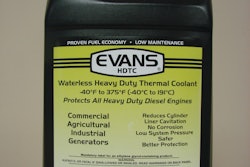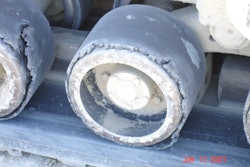The major contributions transportation and goods movement provides to the U.S. economy, the labor market and sustainability will be a primary focus of this week’s national freight sustainability summit in the nation’s capital.
“The U.S. Freight Sustainability Summit: Growing the Economy, Protecting the Environment and Improving Energy Efficiency” is scheduled for Thursday and Friday, November 17 and 18, at the Ronald Reagan Building and International Trade Center.
The Diesel Technology Forum is sponsoring the event along with other organizations and companies like Navistar and summit co-hosts: the U.S. Environmental Protection Agency (EPA), the Environmental Defense Fund, the American Trucking Associations and the Retail Leaders Industry Association.
“We are pleased to have worked with EPA and other industry partners on this national freight summit that will include officials ranging from federal and state transportation and environmental agencies to representatives from the freight and economic sectors of the U.S.,” says Allen Schaeffer, the Executive Director of the Diesel Technology Forum. “Diesel is the prime mover of virtually every mode of freight transportation today and its transformation to a new low-emissions technology makes it a key technology for sustainable goods movement in the future.”
Schaeffer will also participate as a panelist on the “Building an Efficient, Competitive and Environmentally Sustainable Freight Supply Chain in North America” forum Thursday afternoon. (Go here to see the summit agenda.)
Diesel Powers 83% of U.S. Freight By Value and 85% By Weight
“Diesel is a major economic factor and job creator in the U.S. economy and is vital to America’s economic recovery and growth as it transports virtually every commodity available to American consumers,” Schaeffer says. “Diesel-powered trucks, trains, ships and intermodal systems moved 83% of freight by value ($11.7 trillion) and 85% by weight (12.5 billion tons) in 2007.
“Modern diesel technology exemplifies U.S. innovation and technological advancements. The clean diesel industry manufactures and supplies the energy efficient, low-emissions products that are not merely aspirations of possible future energy sources, but highly valued exports that are sought after today by nations in all regions of the world.”
New Economic Report Highlights Diesel’s Economic and Employment Importance to U.S.
Schaeffer says diesel’s significant contributions to the American economy were highlighted in the Forum’s recently-released report - “Diesel Powers the U.S. Economy: Providing High-Paying Jobs, Exports and Long-Term Productivity Gains in the Nation’s Fundamental Sectors.” The report found that the diesel industry contributes more than $480 billion to the U.S. economy and provides over 1.25 million jobs each year.
According to the report: “The synergistic relationship between the nation’s economic well-being and use of diesel technology can be seen even more clearly by examining the linkage between prosperity and diesel-reliant activity such as freight movement. For example, fuel use in trucks is highly correlated with GDP growth, moving together 98.5% of the time.
“The Ceridian-UCLA Pulse of Commerce Index builds on the economic relationships of freight movement and diesel fuel use to track and forecast U.S. economic activity on a nearly real-time basis.”
New Federal Fuel Efficiency Standards to Increase Use of Diesel Fuel in Trucks and Autos
The new economic report also states: “As policymakers look to promote cleaner, more fuel efficient technologies, its use will grow along with other competitive alternatives. Diesel technology’s future value is further enhanced by its suitability for hybrid applications and its readiness to utilize a diverse range of first and second generation renewable and biodiesel fuels.
“National fuel economy standards for cars and light-duty trucks beginning in 2017 are expected to be met in part by an increasing number of clean diesel passenger vehicle choices. Similarly, first-ever fuel efficiency standards for medium- and heavy-duty commercial trucks and buses beginning in 2014 will drive further innovation and efficiency gains in diesel technology as a key compliance strategy.”
EPA’s SmartWay Program Improves Efficiency and Sustainability
"EPA's SmartWay program is a strong example of how we can achieve economic and environmental goals through good partnerships and incentives" says Gina McCarthy, assistant administrator of EPA's Office of Air and Radiation. "Working with EPA, SmartWay partners are finding ways to move goods cleaner and more efficiently across our nation. This helps businesses to cut costs, increase productivity, conserve energy, support job growth and protect the environment. The Freight Sustainability Summit provides an opportunity to share technology innovations and strategies that reduce emissions and improve efficiency, helping to move our nation toward a more sustainable future.”
According to EPA:
- Since 2004, SmartWay partners have saved 50 million barrels of oil. This is equivalent to taking over three million cars off the road for an entire year.
- SmartWay is helping U.S. businesses to slash their fuel costs, saving $6.1 billion dollars to date. These savings support America’s trucking industry and the customers they serve.
- Over 2,900 U.S. corporations including virtually all of the nation’s largest truck carriers, all the Class 1 rail companies and many of the top Fortune 500 companies rely upon SmartWay’s supply chain accounting tools and methods.



















